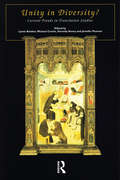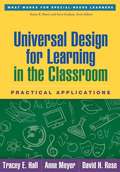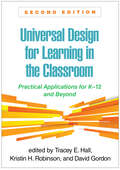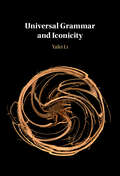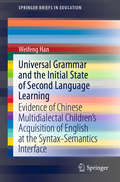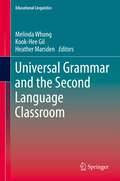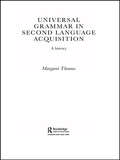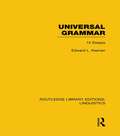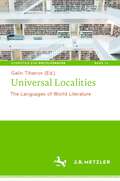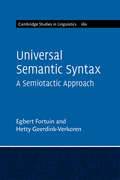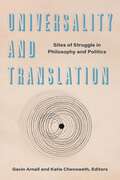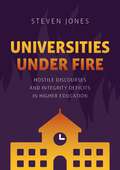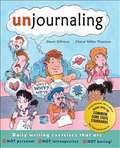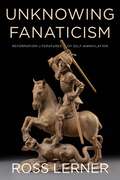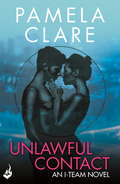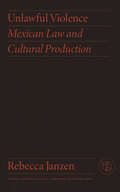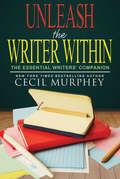- Table View
- List View
Unity in Diversity: Current Trends in Translation Studies
by Lynne Bowker Michael Cronin Jennifer Pearson Dorothy KennyTranslation studies as a discipline has grown enormously in recent decades. Contributions to the discipline have come from a variety of fields, including machine translation, history, literature, philosophy, linguistics, terminology, signed language interpreting, screen translation, translation pedagogy, software localization and lexicography. There is evidently great diversity in translation studies, but is there much unity? Have the different branches of translation studies become so specialized that they can no longer talk to each other? Would translation studies be strengthened or weakened by the search for or the existence of unifying principles? This volume brings together contributions from feminist theory, screen translation, terminology, interpreting, computer-assisted translation, advertising, literature, linguistics, and translation pedagogy in order to counter the tendency to partition or exclude in translation studies. Machine translation specialists and literary translators should be found between the same book covers, if only because the nomadic journeying of concepts is often the key to intellectual discovery and renewal. Celebrating our differences does not mean ignoring what we have in common. Unity in Diversity offers a valuable overview of the current state of translation studies from both theoretical and practical perspectives and makes an important contribution to debates on the future direction of translation studies.
Universal Design for Learning in the Classroom
by Anne Meyer Tracey HallClearly written and well organized, this book shows how to apply the principles of universal design for learning (UDL) across all subject areas and grade levels. The editors and contributors describe practical ways to develop classroom goals, assessments, materials, and methods that use UDL to meet the needs of all learners. Specific teaching ideas are presented for reading, writing, science, mathematics, history, and the arts, including detailed examples and troubleshooting tips. Particular attention is given to how UDL can inform effective, innovative uses of technology in the inclusive classroom.
Universal Design for Learning in the Classroom: Practical Applications for K-12 and Beyond
by David Gordon Tracey E. Hall Kristin H. RobinsonThe Universal Design for Learning (UDL) framework has grown from its origins in special education to being widely used to support all students, making the fully rewritten second edition of this indispensable guide more relevant than ever. Filled with practical, vivid examples and tips, the book demonstrates the power of UDL when applied to particular content areas. Specific teaching ideas are presented for literacy, STEM, project-based learning, career and technical education, and the arts. The editors and contributors describe practical ways to create thriving learning environments that use UDL to meet diverse learners' needs. New to This Edition *Entirely new content. *Coverage expanded from elementary and middle grades to secondary and beyond. *Innovative approaches embracing the growth of UDL and the ubiquity of digital technologies in today&’s classrooms. *Spotlight on issues of equity and inclusion. *Chapters on antiracism, social–emotional learning, career and technical education, journey mapping, and curriculum design. *Compelling discussions of advances in UDL principles and research directions.
Universal Grammar and Iconicity
by Yafei LiWithin linguistics, the formal and functional approaches each offer insight into what language might be and how it operates, but so far, there have been hardly any systematic attempts to integrate them into a single theory. This book explores the relationship between universal grammar - the theory that we have an innate mechanism for generating sentences - and iconicity - the resemblance between form and meaning in language. It offers a new theory of their interactions, 'UG-iconicity interface' (UG-I), which shows that not only do universal grammar and iconicity coexist, but in fact collaborate in intricate and predictable ways. The theory explains various recalcitrant cross-linguistic facts surrounding the serial verb constructions, coordination, semantically and categorically obscure 'linkers', the multiple grammatical aspects of the external argument, and non-canonical arguments. This groundbreaking work is essential reading for researchers and postgraduate students in linguistics, as well as scholars in psychology and cognitive science.
Universal Grammar and the Initial State of Second Language Learning: Evidence of Chinese Multidialectal Children’s Acquisition of English at the Syntax-Semantics Interface (SpringerBriefs in Education)
by Weifeng HanUnder the Universal Grammar (UG) framework, this book discusses the latest research on the role of L1 bidialectism in L2 acquisition, with a particular focus on early Chinese(L1)-English(L2) learners. Responding to the long-standing concern of whether L2 learners have access to UG in the target language, it provides evidence of the positive role of L1 multidialectism in L2 learning and confirms the role of UG in L2 acquisition. This book is essential reading for postgraduates and researchers in language education, linguistics, applied linguistics, speech-language pathology and psychology. The clarification of Chinese as L1 is also of interest to language educators in multilingual contexts.
Universal Grammar and the Second Language Classroom
by Kook-Hee Gil Heather Marsden Melinda WhongThis book proposes that research into generative second language acquisition (GenSLA) can be applied to the language classroom. Assuming that Universal Grammar plays a role in second language development, it explores generalisations from GenSLA research. The book aims to build bridges between the fields of generative second language acquisition, applied linguistics, and language teaching; and it shows how GenSLA is poised to engage with researchers of second language learning outside the generative paradigm. Each chapter of Universal Grammar and the Second Language Classroom showcases ways in which GenSLA research can inform language pedagogy. Some chapters include classroom research that tests the effectiveness of teaching particular linguistic phenomena. Others review existing research findings, discussing how these findings are useful for language pedagogy. All chapters show how generative linguistics can enhance teachers' expertise in language and second language development. "This groundbreaking volume ably takes on the gap that currently exists between generative linguistic theory in second language acquisition (GenSLA) and second language pedagogy, by gathering chapters from GenSLA researchers who are interested in the relevance and potential application of their research to second/foreign language teaching. It offers a welcome and thought-provoking contribution to any discussion of the relation between linguistic theory and practice. I recommend it not only for language teachers interested in deepening their understanding of the formal properties of the languages they teach, but also for linguists interested in following up on more practical consequences of the fruits of their theoretical and empirical research." Donna Lardiere, Georgetown University, Washington DC, USA
Universal Grammar in Second-Language Acquisition: A History (Routledge Studies in the History of Linguistics #7)
by Margaret ThomasFrom the ancient Mediterranean world to the present day, our conceptions of what is universal in language have interacted with our experiences of language learning. This book tells two stories: the story of how scholars in the west have conceived of the fact that human languages share important properties despite their obvious differences, and the story of how westerners have understood the nature of second or foreign language learning.In narrating these two stories, the author argues that modern second language acquisition theory needs to reassess what counts as its own past. The book addresses Greek contributions to the prehistory of universal grammar, Roman bilingualism, the emergence of the first foreign language grammars in the early Middle Ages, and the Medieval speculative grammarians efforts to define the essentials of human language. The author shows how after the renaissance expanded people's awareness of language differences, scholars returned to the questions of universals in the context of second language learning, including in the 1660 Port-Royal grammar which Chomsky notoriously celebrated in Cartesian Linguistics. The book then looks at how Post-Saussurean European linguistics and American structuralism up to modern generative grammar have each differently conceived of universals and language learning.Universal Grammar in Second Language Acquisition is a remarkable contribution to the history of linguistics and will be essential reading for students and scholars of linguistics, specialists in second language acquisition and language teacher-educators.
Universal Grammar: Fifteen Essays (Routledge Library Editions: Linguistics)
by Edward L. KeenanThis collection of 15 articles reflects Edward Keenan’s long-standing research interests in the comparative syntax of the languages of the world. It includes two seminal ‘foundation’ articles, Noun Phrase Accessibility and Universal Grammar (with Bernard Comrie) and Towards a Universal Definition of ‘Subject of’. Most of the other articles have appeared in a variety of relatively inaccessible places, and so this book brings together for the first time a large body of work supporting the research directions taken in the foundation articles. In addition, one article of a psycholinguistic sort was specially prepared for this volume.
Universal Handwriting 1: Reinforcing Manuscript
by Thomas Wasylyk Jennifer SchweighoferNIMAC-sourced textbook
Universal Handwriting 2MC: Manuscript Review and Introduction to Cursive
by Thomas Wasylyk Jennifer SchweighoferNIMAC-sourced textbook
Universal Handwriting 3: Beginning Cursive
by Thomas Wasylyk Jennifer SchweighoferNIMAC-sourced textbook
Universal Handwriting 4: Reinforcing Cursive
by Thomas Wasylyk Jennifer SchweighoferNIMAC-sourced textbook
Universal Handwriting 5: Mastering Cursive
by Thomas Wasylyk Jennifer SchweighoferNIMAC-sourced textbook
Universal Handwriting K: Beginning Manuscript
by Thomas Wasylyk Jennifer SchweighoferNIMAC-sourced textbook
Universal Localities: The Languages of World Literature (Schriften zur Weltliteratur/Studies on World Literature #13)
by Galin TihanovThe volume features the work of leading scholars from the US, UK, Germany, China, Spain, and Russia and presents an important contribution to current debates on world literature. The contributions discuss various facets of the historically changing role and status of language in the construction of notions of universality and locality, of difference, foreignness, and openness; they explore the relationship between world literature and bilingualism, supranational languages, dialects, and linguistic inbetweenness. They also examine the larger social and political stakes behind both foundational and more recent attempts to articulate ideas of world literature. Mapping the space between philology, anthropology, and ecohumanities, the essays in this volume approach world literature with sophisticated methodological toolkits and open up new opportunities for engaging with this important discursive framework.
Universal Semantic Syntax: A Semiotactic Approach (Cambridge Studies in Linguistics #160)
by Egbert Fortuin Hetty Geerdink-VerkorenSyntactic theory has been dominated in the last decades by theories that disregard semantics in their approach to syntax. Presenting a truly semantic approach to syntax, this book takes as its primary starting point the idea that syntax deals with the relations between meanings expressed by form-meaning elements and that the same types of relations can be found cross-linguistically. The theory provides a way to formalize the syntactic relations between meanings so that each fragment of grammar can be analyzed in a clear-cut way. A comprehensive introduction into the theoretical concepts of the theory is provided, with analyzes of numerous examples in English and various other languages, European and non-European, to illustrate the concepts. The theory discussed will enable linguists to look for similarities between languages, while at the same time acknowledging important language specific features.
Universality and Translation: Sites of Struggle in Philosophy and Politics
by Gavin Arnall and Katie ChenowethWithin contemporary theory, the concepts of translation and universality have frequently been associated with different and even opposed philosophical and political projects: watchwords of either domination or liberation, the erasure of difference or the defense of difference. The universalizing drives of capitalism, colonialism, and other systems of oppression have precipitated widespread suspicion of any appeal to universality. This has led some, in turn, to champion the very notion of universality as antithetical to these systems of oppression. Similarly, recent scholarship has begun to grapple with the fundamental role of translation not only in forging inclusive democratic politics but also, by contrast, in violence, including imperial expansion and global war. The present volume advocates neither for nor against translation or universality as such. Instead, it attends to their insurmountable ambiguity and equivocity, the tensions and contradictions that are internal to both concepts and that exist between them. Indeed, the wager of this volume is that translation, universality, and their relationship name irreducible yet overlapping sites of struggle for a diverse array of struggles on the Left.Drawing from multiple intellectual traditions and orientations, with a special emphasis on deconstruction and Marxism, this volume both reveals and participates in a subterranean current of thought committed to theorizing the dynamic, plural, and ultimately inextricable relationship between translation and universality. Its contributors approach this problem in ways that challenge and unsettle dominant trends within translation studies and critical and postcolonial theory, thereby opening new lines of inquiry within and beyond these fields.
Universes without Us: Posthuman Cosmologies in American Literature
by Matthew A. TaylorDuring the nineteenth and early twentieth centuries, a wide variety of American writers proposed the existence of energies connecting human beings to cosmic processes. From varying points of view—scientific, philosophical, religious, and literary—they suggested that such energies would eventually result in the perfection of individual and collective bodies, assuming that assimilation into larger networks of being meant the expansion of humanity&’s powers and potentialities—a belief that continues to inform much posthumanist theory today.Universes without Us explores a lesser-known countertradition in American literature. As Matthew A. Taylor&’s incisive readings reveal, the heterodox cosmologies of Edgar Allan Poe, Henry Adams, Charles Chesnutt, and Zora Neale Hurston reject the anthropocentric fantasy that sees the universe as a kind of reservoir of self-realization. For these authors, the world can be made neither &“other&” nor &“mirror.&” Instead, humans are enmeshed with &“alien&” processes that are both constitutive and destructive of &“us.&” By envisioning universes no longer our own, these cosmologies picture a form of interconnectedness that denies any human ability to master it.Universes without Us demonstrates how the questions, possibilities, and dangers raised by the posthuman appeared nearly two centuries ago. Taylor finds in these works an untimely engagement with posthumanism, particularly in their imagining of universes in which humans are only one category of heterogeneous thing in a vast array of species, objects, and forces. He shows how posthumanist theory can illuminate American literary texts and how those texts might, in turn, prompt a reassessment of posthumanist theory. By understanding the posthuman as a materialist cosmology rather than a technological innovation, Taylor extends the range of thinkers who can be included in contemporary conversations about the posthuman.
Universities Under Fire: Hostile Discourses and Integrity Deficits in Higher Education (Palgrave Critical University Studies)
by Steven JonesThis book explores the ways in which the contemporary university is talked about, and talks about itself. Focusing on English higher education, Jones documents how an under-confident sector internalised the language and logic of government policy, and individual institutions then set about normalising competition and gaming short-term advantage at the expense of collectively serving a common good. A flawed marketisation project was attended and sustained by hostile discourses, with purportedly woke universities becoming a soft target for right-leaning politicians and media commentators, and campuses reluctant battlefields for manufactured culture wars. Within this context, integrity deficits soon arose: universities bragged about diversity and social responsibility without commensurate action; global ambitions went unmatched by local accountability; senior management grew more distant and self-rewarding as contractual precarity increased for frontline staff. Jones does not call for a return to any golden age of academic self-rule. Rather, he warns that without self-assured new stories, firmly underpinned by more transparent and moral forms of governance, universities risk further compromising their standing as trusted public institutions at the very moment they are needed most.
University English for Academic Purposes in China: A Phenomenological Interview Study
by Xiaofei RaoThis book uses an in-depth, phenomenological interview approach to explain the generational characteristics of today’s Chinese university youths and the critical dispositions they believe indispensable in acquiring English as an academic language in and outside school settings. By presenting the authentic voices of the recruited participants, the book clarifies how English for academic purposes (EAP), as an emerging global phenomenon and a research-informed practice, enables and empowers them for conscious self-transformation and critical awareness development through language study. The book also explores issues arising in the fields of general English language teaching as well as traditional and critical EAP, and discusses university English language learners’ learning needs and rights. The book further promotes a dynamic and transformative University EAP pedagogy of particularity, practicality, and possibility moving from the oppression of language education to its liberation, and the increasing critical consciousness among the present and future university youths in a time of great social changes.
Unjournaling: Daily Writing Exercises That Are Not Personal, Not Introspective, Not Boring!
by Cheryl Miller Thurston Dawn DiprinceThe more than 200 impersonal but engaging writing prompts in this exercise book help students practice their writing skills without asking them to share personal thoughts they would rather keep to themselves. Quirky, challenging, and humorous, the ideas encourage lighthearted creativity with such topics as writing about a girl named Dot without using any letters with dots (such asiorj), describing a person named Chris by the reactions of others as he walks into a room, or creating three completely different sentences with the word crumpled. Sample responses are included for all the exercises, making this an ideal classroom resource.
Unknowing Fanaticism: Reformation Literatures of Self-Annihilation
by Ross LernerWe may think we know what defines religious fanaticism: violent action undertaken with dogmatic certainty. But the term fanatic, from the European Reformation to today, has never been a stable one. Then and now it has been reductively defined to justify state violence and to delegitimize alternative sources of authority. Unknowing Fanaticism rejects the simplified binary of fanatical religion and rational politics, turning to Renaissance literature to demonstrate that fanaticism was integral to how both modern politics and poetics developed, from the German Peasants’ Revolt to the English Civil War.The book traces two entangled approaches to fanaticism in this long Reformation moment: the targeting of it as an extreme political threat and the engagement with it as a deep epistemological and poetic problem. In the first, thinkers of modernity from Martin Luther to Thomas Hobbes and John Locke positioned themselves against fanaticism to pathologize rebellion and abet theological and political control. In the second, which arose alongside and often in response to the first, the poets of fanaticism investigated the link between fanatical self-annihilation—the process by which one could become a vessel for divine violence—and the practices of writing poetry. Edmund Spenser, John Donne, and John Milton recognized in the fanatic’s claim to be a passive instrument of God their own incapacity to know and depict the origins of fanaticism. Yet this crisis of unknowing was a productive one. It led these writers to experiment with poetic techniques that would allow them to address fanaticism’s tendency to unsettle the boundaries between human and divine agency and between individual and collective bodies. These poets demand a new critical method, which this book attempts to model: a historically-minded and politicized formalism that can attend to the complexity of the poetic encounter with fanaticism.
Unlawful Contact: I-Team 3 (I-Team)
by Pamela ClareFans of Suzanne Brockmann, Maya Banks, Christy Reece, Julie Ann Walker and Cindy Gerard will adore Pamela Clare's expertly plotted romantic suspense series, which sets the pages alight with sizzling chemistry. For tension, thrills, romance and passion take a spin with the I-Team.Taken hostage by a convicted murderer while reporting at a prison, Sophie Alton has no idea that the man holding the gun to her head is the bad boy who was her first love in high school. Condemned to life without parole, Marc Hunter finds himself with no choice but to break out of prison after his younger sister disappears with her baby. Though he regrets what he has to put Sophie through, he can't let anything get in the way of stopping the corrupt officials who are set on destroying what's left of his family. But being near Sophie rekindles memories for both of them. And, as the passion between them heats up, so does the conspiracy to put both of them in their graves...Sexy. Thrilling. Unputdownable. Take a wildly romantic ride with Pamela Clare's I-Team: Extreme Exposure, Hard Evidence, Unlawful Contact, Naked Edge, Breaking Point, Striking Distance, Seduction Game.
Unlawful Violence: Mexican Law and Cultural Production (Critical Mexican Studies)
by Rebecca JanzenViolence has only increased in Mexico since 2000: 23,000 murders were recorded in 2016, and 29,168 in 2017. The abundance of laws and constitutional amendments that have cropped up in response are mirrored in Mexico's fragmented cultural production of the same period. Contemporary Mexican literature grapples with this splintered reality through non-linear stories from multiple perspectives, often told through shifts in time. The novels, such as Jorge Volpi's Una novela criminal [A Novel Crime] (2018) and Julián Herbert's La casa del dolor ajeno [The House of the Pain of Others] (2015) take multiple perspectives and follow non-linear plotlines; other examples, such as the very short stories in ¡Basta! 100 mujeres contra la violencia de género [Enough! 100 Women against Gender-Based Violence] (2013), present perspectives from multiple authors. Few scholars compare cultural production and legal texts in situations like Mexico, where extreme violence coexists with a high number of human rights laws. Unlawful Violence measures fictional accounts of human rights against new laws that include constitutional amendments to reform legal proceedings, laws that protect children, laws that condemn violence against women, and laws that protect migrants and Indigenous peoples. It also explores debates about these laws in the Mexican house of representatives and senate, as well as interactions between the law and the Mexican public.
Unleash the Writer Within: The Essential Writers’ Companion
by Cecil MurpheyBeloved author Cecil (Cec) Murphey says, "The best kind of writing occurs when it comes from the heart. It's called being authentic or transparent. Too many writers have an insatiable need to be accepted, liked, or admired, and those needs become more important than being true to their convictions. Be you when you write."But having the courage to tap into your innermost self and write purely from your spirit doesn't always come naturally, which is why he wrote Unleash the Writer Within to guide you along the way. In this book, Cec helps you:* Answer why you write;* Find the real you;* Understand your inner critic;* Determine your strengths and weaknesses;* Honor, embrace, and grow your voice;* Discover your rhythm;* Overcome your barriers to honest writing.Unleash the Writer Within is sure to become your most-used and marked-up writing companion. It also serves as an excellent resource for writers' events, group discussions, and conferences.Note: UNLEASH THE WRITER WITHIN is a previously published work, and is not substantially different from the original edition.
